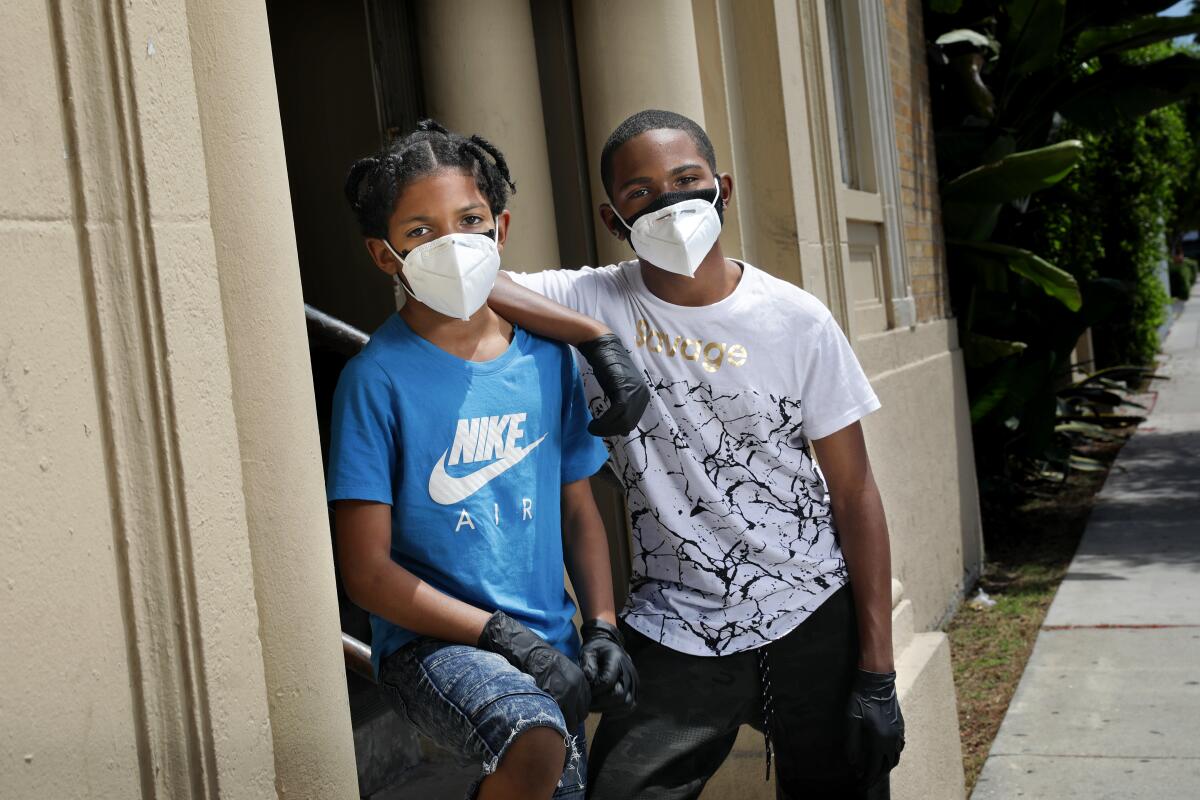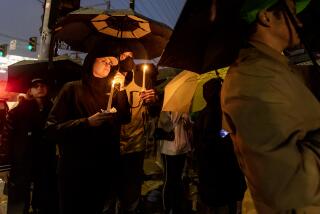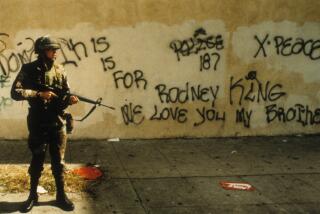Column: ‘White people don’t get treated like that’: South L.A. kids react to George Floyd’s death

- Share via
Evan and Noah are brothers who live in Watts with their mom, Angel Clayton, their auntie and their grandmother.
Evan is 12 and just finishing sixth grade. Noah, 9, is about to finish fourth.
I met the boys in May. They were having trouble doing their schoolwork during the coronavirus shutdown because they didn’t have laptops. After a friendly prosecutor bought them Chromebooks, things started looking up.
When we videochatted Monday, their report cards had just landed.
“All A’s!” said Evan.
They don’t play outside, they told me when I first met them, because their neighborhood is not safe.
“You are pretty much raised not to call the police because they bring more trouble than you had before,” Clayton told me.
In the wake of the killing of George Floyd, I wanted to know whether the brothers had seen the video of Floyd pleading for his life as a white Minneapolis police officer knelt on his neck and what they were thinking about his death and the protests that followed.
Evan did not mince words.
“It wasn’t an accident,” he said. “It’s not like the police officers didn’t know what was going on — they knew exactly. He said he couldn’t breathe. If you are here to help us, you are supposed to give him medical treatment or call the people who give it, and they didn’t do anything. They just let him die.”
You can see why I wanted you to hear from Evan and Noah. They are wise, opinionated and refreshingly unguarded.
Without any prompting, Evan offered an apt hypothetical.
“If those four officers were black and George Floyd was white, those four officers would have gotten capital murder and spent the rest of their lives in jail. But since it’s the other way around, those officers get a pat on the back and maybe eight years. While he gets eight years, we have lost another black person in our community.”
Noah, who turns 10 in July, had barely begun to talk to me when he began to weep. “It’s very painful,” he said. “We’re not getting treated right. White people don’t get treated like that.”
He imagines the horror of being in Floyd’s place.
“If I die without having any air, or just getting shot brutally…” His voice trails off as tears wet his cheeks.
“I go to my mom sometimes and say, ‘Why do we have to go through this?’ She tells me it’s OK, that we will get through it… We’ll get through the racism.”
::
Every generation, it seems, our city explodes in spasms of righteous protest and violence sparked by an act of white-on-black police brutality.
Unanswered grievances, buried or ignored for decades, erupt in protests and rage. Overwhelmed police overreact and underreact; the National Guard rolls in.
And a new generation of children understands that inequality is not just a concept but a reality.
Evan and Noah’s grandmother was a child during the Watts riots in 1965, which were sparked by the arrest of a black motorist by a white California Highway Patrol officer.
Their mom was a toddler in 1992, but she remembers the smell of smoke from the fires that raged across the city after the not-guilty verdicts in the police beating of black motorist Rodney King.
“I never thought my generation would be going through racism,” Evan told me. “I thought racism was history. I was wrong. Racism exists and will probably forever exist.”
If it weren’t for the COVID-19 pandemic, Evan said, he’d like to be out there protesting.
I asked him if he’d read about President Trump’s tweet that included the phrase “when the looting starts, the shooting starts.”
“That’s very unprofessional,” Evan said. “You’re supposed to be the president of the United States. Some kids look up to presidents. No kid wants to look up to a president that says that about people who are trying to do something. When we talk, nobody hears us out. We are not trying to kill or inflict pain on anybody. I feel that Donald Trump is entertained by this.”
Evan and Noah just signed up for Pop Warner football, and will play for the Watts Rams, a team created by Los Angeles police officers to mentor kids and to change the long and dysfunctional dynamic between police and residents in Southeast Los Angeles. They both want to play for the NFL.
Until the season starts, since it’s too dangerous to go to a park, Evan works out by running down the tiled hallway of his house.
He admires Colin Kaepernick, who sacrificed his NFL career to make a point about civil rights and police brutality.
Though he dreams of becoming a professional football player, Evan said, “I would trade that just for equality and just for black people to get treated right. I would sacrifice my life so that could happen, so black people can get what they have been deserving since the beginning of time.”
@AbcarianLAT
More to Read
A cure for the common opinion
Get thought-provoking perspectives with our weekly newsletter.
You may occasionally receive promotional content from the Los Angeles Times.











